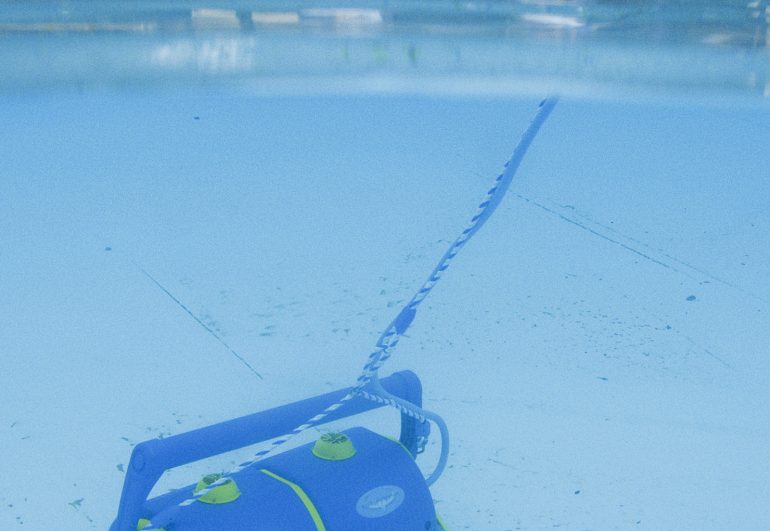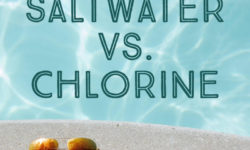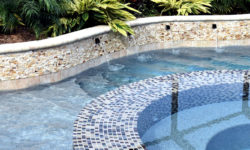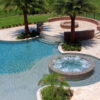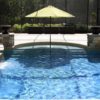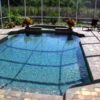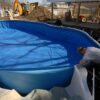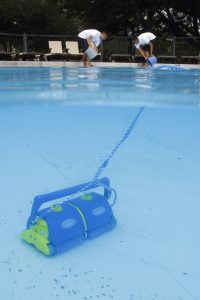 Filtering your Tampa swimming pool is very important. Proper pool maintenance that includes a well-functioning filter system will help your pool to look beautiful for many years.
Filtering your Tampa swimming pool is very important. Proper pool maintenance that includes a well-functioning filter system will help your pool to look beautiful for many years.
This is especially important during the Summer months when violent afternoon thunderstorms can blow all kinds of dirt and debris into your swimming pool. Even if your pool has a screen enclosure, flying debris can cause tears in the screen, and most enclosed pools have planters with dirt, vegetation and critters that sneak in when you're not looking.
Failing to correctly manage your pool creates a dirty mess and an expensive clean up. It's much easier and less expensive to maintain your pool through good filtering than to correct a problem with chemicals. As a result, good pool maintenance saves you both time and money!
Using the right Swimming Pool Filter
When designing or upgrading a pool, selecting the right filtration and water quality systems is important. Swimming pool builders in Tampa, FL understand that maintaining clean, safe, and cost-efficient pools requires more than just standard filtration. Options like ORP systems, cartridge filters, and diatomaceous earth (D.E.) filters offer unique advantages for keeping pools pristine and reducing maintenance costs. Let’s investigate into these systems to explore how they can transform your pool experience.
1. ORP (Oxidation-Reduction Potential) System
-
- How it works: ORP systems measure the effectiveness of chlorine as a sanitizer, rather than just its quantity. They assess the water's oxidation-reduction potential (ORP) and combine it with a pH monitoring system to provide real-time data. These systems can also automate the adjustment of chlorine and pH levels to keep the pool water balanced.
-
-
- Pros:
- Provides precise monitoring of water quality and disinfection levels.
- Can automate chemical adjustments, reducing manual effort.
- Ensures optimal chlorine performance by maintaining the correct pH balance.
- Cons:
- Requires regular calibration and cleaning of sensors for accurate readings.
- Higher upfront costs compared to basic filtration systems.
- Sensitive to high pH levels, which can reduce ORP effectiveness.
- Pros:
-
An ORP system is a valuable addition to any pool setup, complementing the filtration system and enhancing water quality by ensuring balanced sanitation and pH levels.
2. Cartridge Filters
-
-
- How it works: Water passes through a replaceable cartridge element, which captures dirt and particles.
- Pros:
- More efficient at filtering fine particles compared to sand filters.
- No backwashing required, conserving water.
- Cons:
- Requires manual cleaning of the cartridge.
- Replacement cartridges can be expensive.
-
3. Diatomaceous Earth (D.E.) Filters
-
-
- How it works: Water passes through a grid coated with diatomaceous earth, a fine powder made from fossilized remains of diatoms, which acts as an extremely effective filter.
- Pros:
- Provides the highest level of filtration, capturing the smallest particles.
- Keeps water crystal clear.
- Cons:
- Higher cost and more maintenance.
- Requires periodic replenishment of D.E. powder and careful handling.
-
Each system has its advantages and is suited for different pool types, maintenance preferences, and budgets.
Tampa Swimming Pool Filtering Saves Money!
Pool filtering saves water and chlorine. Vegetation, dead insects and other organic matter break down and decompose. Inorganic things that sometimes fall off or blow into a pool like small bits of paper, plastic, and bandages can also affect the chemical balance of your pool. You will use less chlorine if the filter traps most of the organic and inorganic matter. Reducing the chlorine also reduces the need to add in fresh water. The math is simple: less chlorine + less water = less money.
How Long Should I Filter My Pool?
The pool’s filtration system should run long enough to clean the pool water. Variables such as the size of the pool, flow rate of the pool pump, whether the pool has a screen enclosure, the amount of rain and leaves entering the pool, and how often the pool is used all factor into how long the filtration system should be run each day. You can run calculations - pool volume, divided by the flow rate of the pump, times times the number of times you want the water cycled per day. In the winter when the water is cold and there is not as much rain, run the filtration system for 6-8 hours per day. In the summer months, the filter should be running 8-10 hours. We recommend running it from 11 am to 9 pm to get the best filtration time. If the pool is screened or doesn't get much use, 6 hours is usually fine. If the pool is open, gets a lot of leaves in it or gets a lot of use, more filtration is best.
Add and Remove Water from the Pool When Necessary
A lot of debris that ends up in pools floats (at least at first). Therefore, its important to have the proper water level in your pool. When you get a lot of rain, the water level can rise above the top of the skimmer, preventing debris that is floating on the surface of the water from being sucked into the skimmer and filtered out of the water. In this situation, water should be drained from the pool until it is about an inch below the top of the skimmer.
When there are dry periods, the water level can fall near the bottom of the skimmer. If the water level is too low, water may not flow fast enough into the skimmer, causing the pump to "suck air" which can damage the pump. In this situation, water should be added. Ideally, the water level should be about half way between the top and bottom of the skimmer.
Proper Swimming Pool Chemical Balance is Key
In addition to running the filtration system correctly, it's also important for the pool water to have the right chemical balance. Organic debris, rain water, evaporation and chemicals in hair and makeup will alter the chemical levels. Even with filtering, these items can stain your pool and reduce the lifetime of your pool equipment. So, it's important to test your water regularly. Many pool supply stores will even test your pool for free and tell you exactly what chemicals to add to gain the proper balance.
The combination of a properly running the filter system and proper chemical balance, will make your pool a healthy and refreshing source of fun and relaxation for years to come.
If you are considering on a swimming pool company in Tampa, FL, contact us at Grand Vista Pools today!

